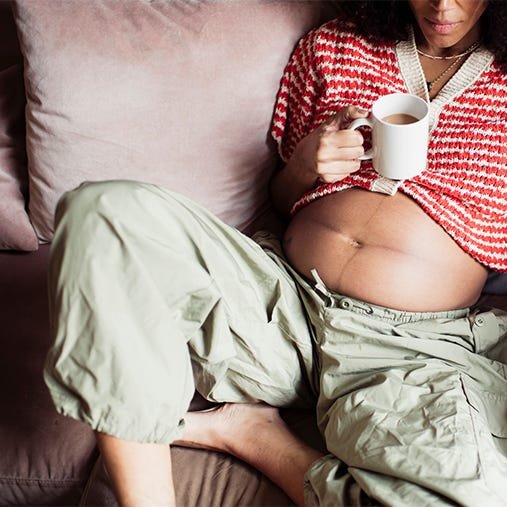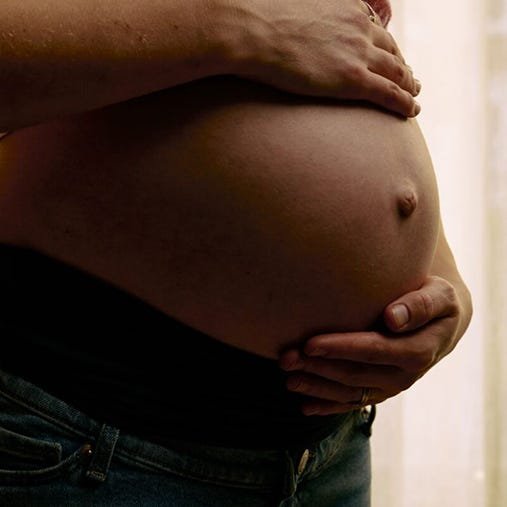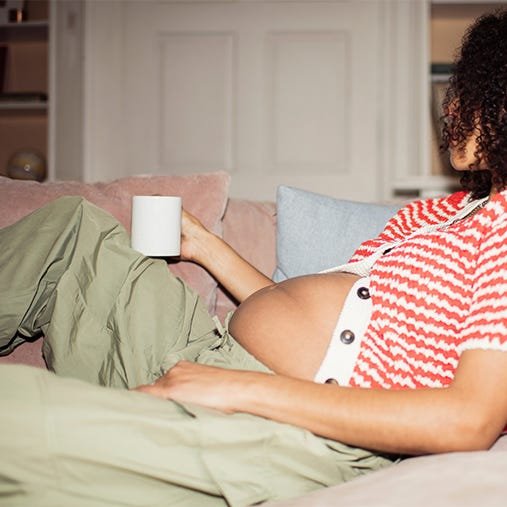If you think you may be pregnant or are seeking a refresher on pregnancy symptoms, we're here to help! Let's explore the typical early signs of pregnancy and discuss how common symptoms change over the three trimesters of pregnancy.
Not everyone will notice or experience the pregnancy symptoms that we're going to cover in this guide. And if you experience any symptoms that feel worrying, you should speak to your midwife or doctor for reassurance.
Common early pregnancy symptoms
Some people experience symptoms before they know for sure if they're pregnant, and others don't. Really, only a pregnancy test can confirm whether you're pregnant or not.
Some of the most common early pregnancy symptoms people experience include:
- Missing a period
- Feeling fatigued and tired
- Experiencing sickness and nausea
- Tenderness in your breasts
- Being extra sensitive to smells
- Having mood swings
- Needing to pee more than usual
- Increased vaginal discharge
Let's run through each of them in more detail.
Missing a period
This is a common first sign of pregnancy. People sometimes miss a period altogether, while others have a lighter than usual period or experience spotting or implantation bleeding.
While missing a period is a tell-tale sign of pregnancy for a lot of people, if you usually have irregular periods, you might not recognise a missed period as an indicator.
Feeling fatigued and tired
It's common to feel tired during the early stages of pregnancy due to fluctuating hormones.
Experiencing sickness and nausea
Although it's known as morning sickness, sickness during pregnancy can happen at any time of the day. If you're pregnant and being sick a lot or can't keep fluids down, you should see your doctor.
Tenderness in your breasts
Many people experience tender boobs during in the early stages of pregnancy. The size of your boobs and the colour of your nipples can also change when you're pregnant.
Being extra sensitive to smells
During pregnancy, people often experience heightened senses, and certain smells can sometimes trigger nausea.
Having mood swings
During pregnancy, it's common to experience changes in mood due to hormonal shifts. Many people may notice that their emotions are heighted and find themselves getting easily upset or angry.
Needing to pee more than usual
Some people find that they need to pee more often throughout all stages of pregnancy. During the later phases, it's mainly caused by the growing baby putting pressure on your bladder.
Increased vaginal discharge
You may notice a change in the consistency and volume of your discharge while you're pregnant.
When do pregnancy symptoms start?
Pregnancy symptoms generally start to appear around four to six weeks into a pregnancy. However, the exact timing can vary and it's important to note that each pregnancy is unique.
Some other pregnancy symptoms you may experience
Now that we've covered some of the most common pregnancy symptoms, let's look at some rarer ones that some people experience.
Feeling dizzy
Feeling dizzy during pregnancy can be attributed to various factors related to the changes happening in your body. Staying hydrated, eating balanced meals, avoiding sudden movements, and getting up slowly from a lying or sitting position can help.
Getting headaches
Hormone fluctuations and increased blood flow during pregnancy can sometimes cause headaches.
Suffering from constipation and cramping
Your digestive system slows down during pregnancy due to hormone changes and so you may experience constipation and cramping.
Having excess saliva
Producing more saliva than usual when you're pregnant is known by the medical term ptyalism gravidarum. It's the body's way of protecting your teeth and mouth from excess stomach acid caused by nausea during pregnancy.
Experiencing nose bleeds and congestion
Increased blood volume and wider blood vessels during pregnancy can contribute to nasal issues, so get your tissues ready!
Getting acne
Hormone surges during pregnancy can cause complexion changes and sometimes pregnancy acne.
Tasting metal in your mouth
One of the stranger symptoms some people say they experience - particularly during the first trimester - is a sour or metallic taste in their mouth almost like blood. This is caused by a change in hormones, in particular oestrogen. The medical term for this is dysgeusia, and it's also often referred to as 'metal mouth'.
Symptoms of pregnancy that can come later
Pregnancy-related symptoms generally start to ease over the course of nine months. But the symptoms you experience early on may be replaced by others as your body adapts and you use more energy to keep yourself and your baby healthy.
As you reach the third trimester and head into the final stretch of your pregnancy, you may notice some of the following symptoms:
Your feet and ankles swelling
Your ankles and feet may swell due to increased blood volume and water retention.
Getting backache
Your ligaments will naturally stretch and soften during pregnancy in preparation for the growing weight of the baby you're carrying and then labour. These changes can cause back pain and strain on the pelvis.
Feeling itchy in your skin
During pregnancy, the skin on your stomach, hips, and breasts stretches, and this can make it tight and itchy. This can also be due to increased blood volume and hormones.
If you have itchy hands and feet, have any yellowing of the skin or dark urine, and the itching is worse at night, you should get checked over by your midwife or doctor as it could be a liver condition called obstetric cholestasis or OC.
Suffering from heartburn and indigestion
As baby grows and take up more and more space, acid from your stomach doesn't have anywhere to go except up. This can lead to heartburn and indigestion that's often worse at night.
Getting haemorrhoids
Constipation can happen throughout pregnancy, leading to straining and haemorrhoids.
Your skin gets darker in some places
Sometimes referred to as 'the mask of pregnancy', Chloasma is when pigment-producing cells produce more melanin pigments when exposed to the sun. It's also worth noting that you can become sunburnt more easily when pregnant because of this, so be sure to wear SPF.









